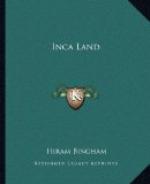------ Figure
Glaciers Between Cuzco and Uiticos ------
The Spaniards who attempted to follow Manco found his position practically impregnable. The citadel of Uilcapampa, a gigantic natural fortress defended by Nature in one of her profoundest moods, was only to be reached by fording dangerous torrents, or crossing the mountains by narrow defiles which themselves are higher than the most lofty peaks of Europe. It was hazardous for Hannibal and Napoleon to bring their armies through the comparatively low passes of the Alps. Pizarro found it impossible to follow the Inca Manco over the Pass of Panticalla, itself a snowy wilderness higher than the summit of Mont Blanc. In no part of the Peruvian Andes are there so many beautiful snowy peaks. Near by is the sharp, icy pinnacle of Mt. Veronica (elevation 19,342 ft.). Not far away is another magnificent snow-capped peak, Mt. Salcantay, 20,565 feet above the sea. Near Salcantay is the sharp needle of Mt. Soray (19,435 ft.), while to the west of it are Panta (18,590 ft.) and Soiroccocha (18,197 ft.). On the shoulders of these mountains are unnamed glaciers and little valleys that have scarcely ever been seen except by some hardy prospector or inquisitive explorer. These valleys are to be reached only through passes where the traveler is likely to be waylaid by violent storms of hail and snow. During the rainy season a large part of Uilcapampa is absolutely impenetrable. Even in the dry season the difficulties of transportation are very great. The most sure-footed mule is sometimes unable to use the trails without assistance from man. It was an ideal place for the Inca Manco.
The conquistador, Cieza de Leon, who wrote in 1550 a graphic account of the wars of Peru, says that Manco took with him a “great quantity of treasure, collected from various parts ... and many loads of rich clothing of wool, delicate in texture and very beautiful and showy.” The Spaniards were absolutely unable to conceive of the ruler of a country traveling without rich “treasure.” It is extremely doubtful whether Manco burdened himself with much gold or silver. Except for ornament there was little use to which he could have put the precious metals and they would have served only to arouse the cupidity of his enemies. His people had never been paid in gold or silver. Their labor was his due, and only such part of it as was needed to raise their own crops and make their own clothing was allotted to them; in fact, their lives were in his hands and the custom and usage of centuries made them faithful followers of their great chief. That Manco, however, actually did carry off with him beautiful textiles, and anything else which was useful, may be taken for granted. In Uiticos, safe from the armed forces of his enemies, the Inca was also able to enjoy the benefits of a delightful climate, and was in a well-watered region where corn, potatoes, both white and sweet, and the fruits of the temperate




